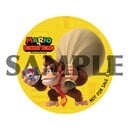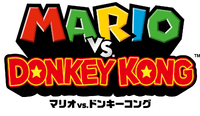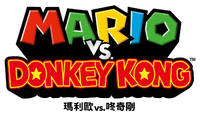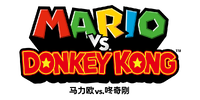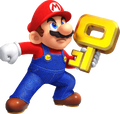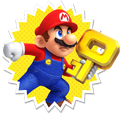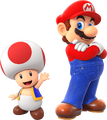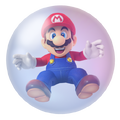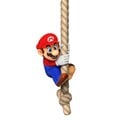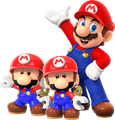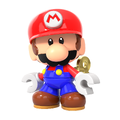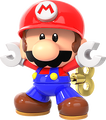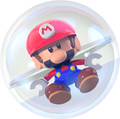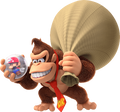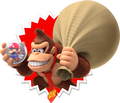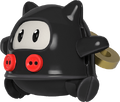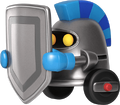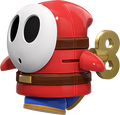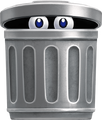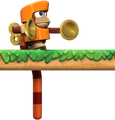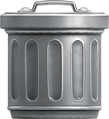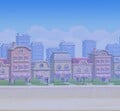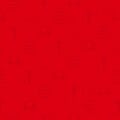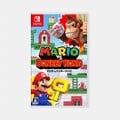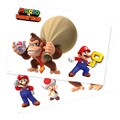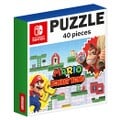Mario vs. Donkey Kong (Nintendo Switch)
This article is about an upcoming game. Editors must cite sources for all contributions to this article. Edits that do not follow this standard may be reverted without notice.
Do not upload any leaked images or media files before this game is released. Per our policy, any such files will be immediately deleted.
| Mario vs. Donkey Kong | |||||||||||||||
|---|---|---|---|---|---|---|---|---|---|---|---|---|---|---|---|
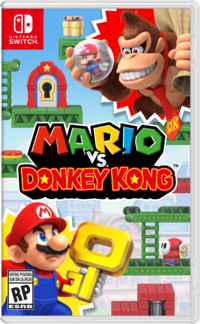 North American prerelease box art For alternate box art, see the game's gallery. | |||||||||||||||
| Developer | Nintendo Software Technology Corporation[1] | ||||||||||||||
| Publisher | Nintendo | ||||||||||||||
| Platform(s) | Nintendo Switch | ||||||||||||||
| Release date | Template:Release | ||||||||||||||
| Language(s) | English (United Kingdom) English (United States) French (France) French (Canada) German Spanish (Spain) Spanish (Latin America) Italian Dutch Japanese Simplified Chinese Traditional Chinese Korean | ||||||||||||||
| Genre | Puzzle/Action | ||||||||||||||
| Rating(s) |
| ||||||||||||||
| Mode(s) | Single-player, local multiplayer | ||||||||||||||
| Input | Nintendo Switch:
| ||||||||||||||
Template:Quote2 Mario vs. Donkey Kong is an upcoming Nintendo Switch remake of the 2004 Game Boy Advance game of the same name. It was first announced during the September 2023 Nintendo Direct, and is set to be released worldwide on February 16, 2024.[2] It is the first Mario vs. Donkey Kong game for Nintendo Switch and also the first one in general since Mario vs. Donkey Kong: Tipping Stars, released almost nine years prior. As a remake of the first game, it is also the first time the gameplay style of the Game Boy version of Donkey Kong has been revisited since the original's release. Unlike the original version's pre-rendered visuals and the rest of the Mario vs. Donkey Kong series opting for a plastic, cartoony look with outlines, the remake adopts a standard modern art style, taking many cues from Super Mario 3D World and its appearance as a theme in Super Mario Maker 2 in particular. Additionally, the game debuts a redesigned logo for the Donkey Kong series. Despite Charles Martinet retiring from his role as Mario, his voice clips are reused in this game.
A free demo of the game was released on the Nintendo eShop on January 31, 2024.[3]
Differences
Gameplay changes
- Casual Mode has been added, with bubbles acting as additional hit points and an infinite time limit.
- Two new worlds, Merry Mini-Land and Slippery Summit, have been introduced as this version of the game's fourth and sixth worlds respectively,[4] with each incorporating all-new obstacles.[5]
- As such, the order of worlds has been rearranged slightly to accommodate the new worlds, bringing the total number of worlds to eight instead of six:
- Mario Toy Company
- Donkey Kong Jungle
- Fire Mountain
- Merry Mini-Land
- Spooky House
- Slippery Summit
- Mystic Forest (changed from a cyan theme color to orange to distinguish itself from Slippery Summit)
- Twilight City
- As such, the order of worlds has been rearranged slightly to accommodate the new worlds, bringing the total number of worlds to eight instead of six:
- Multiplayer is added, with Toad as the second playable character.
- A Time Attack mode has been added.[6]
- The locations of the red and yellow platforms in Level 1-DK have been swapped.
- The bonus Present minigames have been replaced with various new bonus stages.[7] In these stages, the player must catch a floating key that opens a treasure box before the time runs out, earning 5 1-Ups in the process.[8]
- Scoring has been removed.
- Mario's fall damage from heights has been greatly reduced.[9]
- The right stick can be used to control the camera in large-scaled levels.
- Retrying a level or exiting a level that hasn't been cleared yet no longer costs the player a life.
Text changes and localization
- The game has been translated to Chinese (Simplified and Traditional), Dutch, and Korean, three languages that the original was not available in. Additionally, the game will have Canadian French and Latin American Spanish translations.
- The worlds now are translated in the French, Italian, German and Spanish versions while in the original they were left in English in those versions.
Graphical changes
- The game now uses full 3D models rather than pre-rendered sprites.
- The cutscenes are now fully animated, instead of swapping between different static frames.
- When Donkey Kong changes the channel, the announcer saying numbers in Spanish is replaced by upbeat music.
- Donkey Kong no longer makes heart eyes when seeing the Mini Mario; instead, it reflects off of his eyes.
- Additionally, the title screen now has Mario and Donkey Kong with more movements than just their eyes blinking like in the original.
- Tane Pakkun are redesigned into mechanical Fire Piranha Plants.
- The toy Ninjis are now black with red buttons, similar to the regular Ninjis' current design.
- Brickmen are given a pair of movable bricks over their eyes to act as expressive eyebrows.
- Katakata Kaen Heihō are redesigned into blue Snifits.[10]
- Thwomps and Thwimps are redesigned to be mechanical, with a face that slides to change expressions.[10]
- Katakata Yarihō emits Zs when it is sleeping.
- Boos are replaced with their toy counterparts.
- Bob-ombs are redesigned to be slightly more mechanical and toy-like.
- Mario's normal and fire death animations now resemble the ones commonly used in modern mainline Super Mario games, rather than showing him recoil and collapse on the floor.[11]
- There is a blue variant of Fireball that appears in Slippery Summit.
Audio changes
- The music has been rearranged like other remakes.
- Certain worlds such as Fire Mountain have their music completely changed from the original.
- The music won't change when transitioning to the second part of the levels.
- One of the channels heard (the Spanish audio to be exact) on Donkey Kong's television in the intro is changed into a clip of the music for Donkey Kong Plus.
- Nate Bihldorff's voice clips of Shy Guy are heard instead of the fast-talking gibberish when Donkey Kong switches channels to a news broadcast.
- Several archival voice clips of Charles Martinet as Mario and the Mini Marios are repurposed here, though some of these clips are not present in the original game. However, some of Mario's clips from the original remain intact.
- Contrarily, Donkey Kong now uses voice clips by his current voice actor, Takashi Nagasako, as opposed to Grant Kirkhope's performance in the original game, which features audio repurposed from Donkey Kong 64. He also no longer speaks full sentences as he did in the original game.
- Samantha Kelly, in addition to voicing Toad (who does not appear in the original game) through archival voice clips, also voices most of the other Toads throughout the remake in the same way, instead of Jen Taylor's performance from the original game (one clip of Taylor's is retained in the opening cutscenes, however).
Characters
Main characters
| Character | Description |
|---|---|
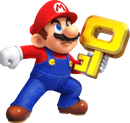 Mario[2] |
The titular protagonist of Mario vs. Donkey Kong. He uses a wide range of moves and abilities as he sets out to rescue the Mini-Marios from Donkey Kong. |
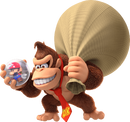 Donkey Kong[2] |
The titular antagonist of Mario vs. Donkey Kong. After robbing the Mario Toy Company and stealing all of the Mini-Mario toys, he faces off against Mario to stop him from retrieving them. |
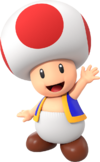 Toad[2] |
A playable character who can be used in co-op mode alongside Mario. |
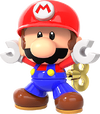 Mini-Marios[2] |
Wind-up toys resembling Mario who were kidnapped by Donkey Kong. |
Items and collectibles
| Enemy | Description |
|---|---|
| File:KeyMVDK.png Key[2] |
Keys are found in the first half of every regular level of the game. They must be taken to locked doors in order to open the second half. |
 1-Up Mushroom[2] |
Green mushrooms that grant the player(s) an extra life. |
 Hammer |
Items that can be grabbed by Mario and used to defeat enemies. |
| File:MvsDK NS Letter T.pngFile:MvsDK NS Letter O.pngFile:MvsDK NS Letter Y.png Letters |
Letters that spell out the word "TOY" appearing exclusively in Mini-Mario levels that must be collected to complete the level. They can only be collected by the Mini-Marios. |
 Toy box |
Objects that serve as the goal in Mini-Mario levels and can be opened by collecting all three letters in the level. |
Enemies and obstacles
Enemies
| Enemy | Description |
|---|---|
 Shy Guys[2] |
Wind-up Shy Guys that walk throughout the levels, and can be jumped on. |
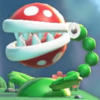 Tane Pakkun[2] |
Mechanical plants that spit fireballs, which damages the player(s) upon contact. |
| File:PurpleRinoMVDK.png RamRams[2] |
Enemies resembling purple rhinoceroses. They attack by charging at and ramming the player(s). RamRams can be picked up and thrown on to Spikes, allowing them to be used as platforms. |
 Monchees[2] |
Mechanical monkeys with long tails that hang below the platforms they are on. Mario can hang from their tails without getting harmed. However, he still loses an extra life if he touches a Monchee's body. |
 Brickmen[2] |
A creature hidden in a pile of bricks. They throw three lines of bricks under them, forcing Mario to handstand to avoid being hit. |
 Ninjis[2] |
Mechanical enemies wearing black ninja outfits with two red buttons. They jump repeatedly in place, and can be used as platforms to traverse spikes. |
 Lava Bubbles[2] |
Enemies that are found jumping repeatedly out of lava, and will burn the player(s) upon touching them. |
 Snapjaws[2] |
Crocodile-like enemies that climb ropes. They can only be defeated by falling fruit. |
 Birds[10] |
Avian enemies that fly around and can drop eggs on the player(s), which can be avoided by performing a handstand. |
 Katakata Kaen Heihōs[10] |
Blue Snifits that attack the player(s) with blowtorches. |
 Thwimps[10] |
Enemies that attempt to crush the player(s) when they get close. |
 Thwomps[10] |
Enemies that fall down when the player(s) approach them. Touching one causes an extra life to be lost. |
  Fireballs |
Enemies that move from side to side on a platform and can burn Mario if he touches them. There is also a blue variant. |
 Bob-ombs |
Enemies that light their fuses and explode a few seconds after when Mario is near. They can be carried by Mario and used to defeat other enemies. |
 Boos |
Wind-up Boos that chase the player(s) when they are not looking and remain still while they are being watched. |
 Katakata Yarihō |
Enemies that are first found sleeping. Once Mario gets near them, they wake up and start running after him. They go back to sleep if they touch a platform's edge. |
 Firebirds |
Flaming avian enemies that fly across the stage and can drop burning eggs on the player(s). |
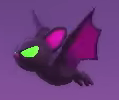 Kōmori |
Bat enemies that fly horizontally, across the stage, and can cause the player(s) to fall from the rope that they were climbing. |
  Polterguys |
Wind-up Shy Guy ghost enemies that transform into blocks when the player(s) press a Color Switch. |
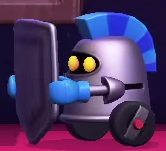 Sir Shovalot |
Knight-like enemies that push the player(s) using their shield. |
Objects
Blocks
| Block | Description |
|---|---|
 Help Blocks[2] |
Gray and black variants of ? Blocks that give the player(s) hints and information about the game when hit. |
 Sand blocks[2] |
Blocks that crumble into dust when stood on. |
  Dotted-Line Blocks[2] |
Blocks that become solid once a Color Switch of the same color is activated by the player(s). |
 Donut Blocks |
Orange blocks that fall if the player stands on them for too long. |
 Warp Boxes |
Clear boxes that teleport the player to another box with the corresponding color and are activated by Color Switches. |
Obstacles and platforms
| Object | Description |
|---|---|
Spikes[2] |
Harmful traps that cause the player(s) to lose a life if touched. |
Lifts[2] |
Platforms that are found traveling along tracks, or being lifted by Lava Geysers. |
| File:LadderMVDK.png Ladders[2] |
Climbable objects of various colors, lengths, and visual styles. |
Ropes[2] |
Climbable objects that hang from trees or metal rings. Snapjaws can be found moving along some vertical ropes. Horizontal rope variants can also be found, which the player can grab and swing upwards from. |
| File:TrampolineMVDK.png Springs[2] |
Can be jumped off of to reach high platforms. |
 Lava Geysers[2] |
Spouts of lava that rise and cause Lifts to float on top of them, allowing the player(s) to reach higher ground. |
| File:RedSwitchMVDK.png Color Switches[2] |
Switches are found in three versions: red, yellow, and blue. As the main effect, the switch that is active makes platforms, blocks, and ladders of the same color available to use. |
Tracks[2] |
Objects that constantly move platforms along a set path. |
| File:SemisolidPlatformMVDK.png Semisolid Platforms[2] |
Platforms of varying styles that have solid surfaces, but can be jumped through from below. |
  Barrels and Garbage Cans[2] |
Can be carried and thrown by the player(s). They can be used to defeat certain enemies, or as auxiliary platforms to reach other platforms or to pass wide gaps with Spikes. |
 Kurasshā[2] |
Grey and yellow stone blocks that rise when the player(s) stand on them. |
| File:Nocoverart.png Fuwafuwa Flowers[12] |
A floating, fan-like flower that produces a continuous gust, which can carry Mario and various objects in one direction. Fuwafuwa Flowers of a specific color are activated simultaneously by pressing a corresponding Color Switch. |
 Trampoline |
Functions the same as springs but can also be picked up and thrown. |
 Bird Nests[10] |
Objects that Birds can spawn from. |
| File:CandleMvsDK.png Candles[10] |
An obstacle that moves up and down and burn the player(s) on contact. They can be defeated with a Hammer. |
| File:OilMvsDK.png Oil[10] |
An obstacle that moves up and down and burn the player(s) on contact. They can be defeated with a Hammer. |
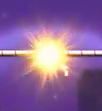 Wire Traps |
Indestructible balls of electricity that travel along wires and electrocute Mario upon contact. |
Promotion
- By pre-ordering the game through Otakara, customers will receive a tin badge depicting Donkey Kong.[13]
- A bundle containing the game, a 40-piece puzzle, and a set of three stickers is sold on the European My Nintendo Store.[14]
References to other media
- Mario vs. Donkey Kong: Mini-Land Mayhem!: The background of Merry Mini-Land is seemingly based on Coaster Hills, an attraction from this game.[15]
- Super Mario 3D World: Some of Mario's voice clips are reused from this game. The heads-up display is also somewhat adapted from this game including its font, although the character portraits are rendered 3D models instead of 2D artwork.[2]
- Mario Kart 8: Some of Donkey Kong's voice clips are reused from this game.[2]
- Mario Party: Star Rush: Mario's render for this game is reused for his life icon while Toad's life icon is a recolored variant of other colored Toads' renders.[2]
- Super Mario Maker 2: Builder Toads can be seen working in the Mario Toy Company building's factory.[2]
- Mario Party Superstars: Toad's artwork from this game is repurposed.
Gallery
Logos
Artwork
Characters
Mario and Toad
Mario inside a bubble
Mario using a Hammer
Mario sliding on a rope
Mario holding a Shy Guy (toy)
Mario and Mini-Marios
Items
Key artwork
World icons
Miscellaneous
Flyer about Mini-Mario
Screenshots
Screenshot of Level 1-1
Screenshot of Level 1-6
Screenshot of Level 2-DK
Box art
Miscellaneous
Stickers distributed in a special bundle with this game on the European My Nintendo Store
Names in other languages
| Language | Name | Meaning | Notes |
|---|---|---|---|
| Japanese | マリオ Mario buiesu Donkī Kongu |
Mario vs. Donkey Kong | |
| Chinese (simplified) | 马力欧vs.咚奇刚[?] Mǎlì'ōu vs. Dōngqí Gāng |
Mario vs. Donkey Kong | |
| Chinese (traditional) | 瑪利歐vs.咚奇剛[?] Mǎlì'ōu vs. Dōngqí Gāng |
Mario vs. Donkey Kong | |
| Korean | 마리오 vs. 동키콩[?] Mario vs. Dongki Kong |
Mario vs. Donkey Kong |
External links
- Official North American game page
- Official Canadian (French) game page
- Official Latin American game page
- Official Brazilian game page
- Official Japanese game page
- Official Japanese My Nintendo Store page
- Official United Kingdom game page
- Official Belgium (Dutch) game page
- Official Belgium (French) game page
- Official German game page
- Official España game page
- Official French game page
- Official Italian game page
- Official Dutch game page
- Official Austrian game page
- Official Portuguese game page
- Official Swiss (German) game page
- Official Swiss (French) game page
- Official Swiss (Italian) game page
- Official South African game page
- Official Australian game page
References
- ^ Initial post about the Instagram story from an NST contractor Instagram story itself
- ^ a b c d e f g h i j k l m n o p q r s t u v w x y z aa ab ac ad ae af ag Nintendo of America (September 14, 2023). Nintendo Direct 9.14.2023 - Nintendo Switch. YouTube. Retrieved September 14, 2023.
- ^ https://twitter.com/NintendoAmerica/status/1752859619943194810>
- ^ @NintendoAmerica (January 19, 2024). "Chase Donkey Kong through eight worlds – including two brand-new ones – to recover the Mini-Marios! #MariovsDonkeyKong". X. Retrieved January 20, 2024.
- ^ https://nintendoeverything.com/mario-vs-donkey-kong-new-details-revealed-pieces-of-the-puzzle-trailer/
- ^ https://nintendoeverything.com/mario-vs-donkey-kong-new-details-revealed-pieces-of-the-puzzle-trailer/
- ^ https://twitter.com/NintendoAmerica/status/1751334271384474083
- ^ https://youtu.be/jVtkoc7mRSA?si=z6Kip2wtIzLaX6v0&t=112
- ^ https://twitter.com/MaroWeeb/status/1752881130494149104
- ^ a b c d e f g h i Nintendo (January 12, 2024). Mario vs. Donkey Kong | Nintendo Switch | Nintendo.
- ^ https://www.youtube.com/watch?v=Xnkzn62vZd8
- ^ Official microsite of Mario vs. Donkey Kong for Nintendo Switch. Section 「ワールド」 ("World"). nintendo.com (Japan). Retrieved February 5, 2024. (Archived January 11, 2024, 01:12:02 UTC via Wayback Machine.) 「カラースイッチで作動する風に乗って移動できるフワフワフラワーや、ボムへいを利用して道を切りひらく。」
- ^ 【オリジナル特典】マリオvs.ドンキーコング 予約受付中 Otakarasoko.
- ^ Mario vs. Donkey Kong + Puzzle + Set of 3 Stickers. store.nintendo.co.uk. Retrieved January 14, 2024. (Archived January 14, 2024, 22:30:06 UTC via archive.today.)
- ^ Nintendo of America (January 10, 2024). Mario vs. Donkey Kong — Pieces of the Puzzle — Nintendo Switch. YouTube. Retrieved January 10, 2024.
